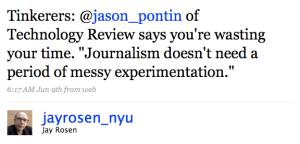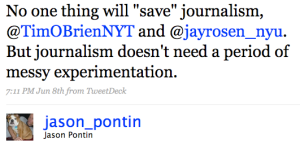A few days ago a peculiar Tweet from NYU journalism professor Jay Rosen popped up in my Twitter feed.

This gave me some pause. I thought, “Really? Journalism doesn’t need experimentation?” Surely Jason Pontin can’t be serious. But no, that’s really what he said.

Experimentation is the mother of invention, or something like that. Right? I hate to use Google as an example of experimentation gone right, but, well, that’s really what they are.
To illustrate my point, I suggest reading this fascinating piece in The Huffington Post by Daniel Sinker, journalism faculty member at Columbia College.
The kicker: Five years ago, Google’s entire revenue was a scant $3 billion. Newspapers’ print ad sales for 2004? $48.2 billion. And yet, with significantly smaller revenues, over that five year window, Google launched or acquired 35 products.
Each of those 35 products constitutes “messy experimentation.” I can’t imagine the people at Google thought, prior to launching Picasa, that it would take off. With every launch there’s a sense of “this might work, it might not.”
Journalism as a craft isn’t going anywhere. The industry, however, will continue to fall apart. We’ll probably see more big titles fall before this is said and done. There aren’t any investors rushing to the side of newspapers, mostly because they aren’t seen as being innovative, dynamic products. Some have begun to turn the corner and see themselves as not being immune to the economic situations and technological preferences of their readers.
But for the time being, experimentation will be the only way to really learn what works and what doesn’t. Otherwise we’re just treading water. Barely.
Filed under: newspaper websites, social media, blogging, hyperlocalism, new media, newsapers
The figures are staggering. I dont know the US market but India’s major newspapers meanwhile were in the same mood.
Their focus has been reach, distribution.
Same content, different format but fresher markets. It just struck me they never had any significant innovations that come to the mind. I followed them for 5 years.
Thanks